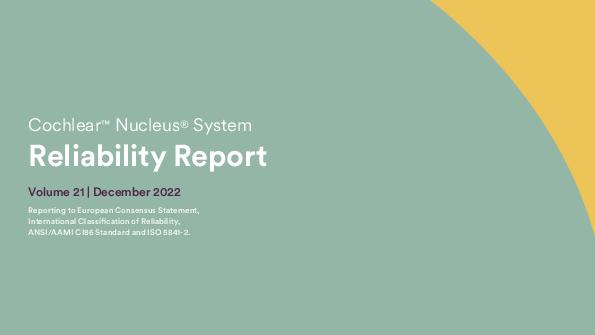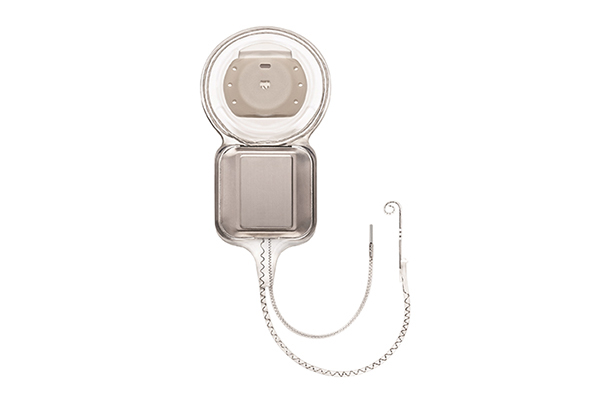Cochlear™ Nucleus® Reliability
Cochlear™ Nucleus® Reliability Reporting:
Human needs have always been our inspiration. We start with people in mind and the understanding that reliability is incredibly important in helping recipients experience a life full of hearing.
Cochlear has now provided more than 475,000 cochlear implants to people of all ages across more than 180 countries. When someone chooses Cochlear, they are choosing a quality partner who will support their hearing experience over the long term. We are the leader in implant reliability for both adults and children, and no other cochlear implant manufacturer can demonstrate the same reliability track record.
About our reporting
Cochlear reliability reporting provides reliability data for the internal (cochlear implant) and external (sound processor) components of our Nucleus Implant Systems.
Implant reliability data
The implant data in the annual reliability report is based on the reporting methodology recommended by International Standard ISO 5841-2 1,2, the reporting principles outlined in the European Consensus Statement on Cochlear Implant Failures and Explantations 3 and expert recommendations from the International Classification of Reliability for Implanted Cochlear Implant Receiver Stimulators 4. This annual reliability report meets the standards for cochlear implant reliability reporting outlined in these standards.
For implant reliability data based on the reporting standards and methodology recommended by ANSI/AAMI CI86 – Cochlear implant systems: Requirements for safety, functional verification, labeling and reliability reporting 5, the Cochlear Nucleus ANSI/AAMI Standard report will continue to be available on an annual basis.
Sound processor reliability data
The sound processor data in our annual reliability report meets the reporting standards and methodology recommended by ANSI/AAMI CI86 – Cochlear implant systems: Requirements for safety, functional verification, labeling and reliability reporting.5
Cochlear Nucleus Reliability Reports
Cochlear Nucleus System Reliability Report - Volume 22, December 2023
Understand our Reliability Reporting
AANSI/AAMI CI86 Reliability Report - Volume 10, December 2023
Past Cochlear Nucleus Reliability Reports 2
Cochlear™ Nucleus® Reliability Report - Volume 21, Dec 2022
Cochlear™ Nucleus® Reliability Report - Volume 20, Dec 2021
Cochlear™ Nucleus® Reliability Report - Volume 19, Dec 2020
Cochlear™ Nucleus® Reliability Report - Volume 18, Dec 2019
Cochlear™ Nucleus® Reliability Report - Volume 17, Dec 2018
Cochlear™ Nucleus® Reliability Report - Volume 16, Dec 2017
Cochlear™ Nucleus® Reliability Report - Volume 15, Jan 2017
Cochlear™ Nucleus® Reliability Report - Volume 14, Feb 2016
Cochlear™ Nucleus® Reliability Report - Volume 13, Feb 2015
Cochlear™ Nucleus® Reliability Report - Volume 12, Feb 2014
Cochlear™ Nucleus® Reliability Report - Volume 11, Feb 2013
Cochlear™ Nucleus® Reliability Report - Volume 10, Feb 2012
Cochlear™ Nucleus® Reliability Report - Volume 9, Aug 2011
Cochlear™ Nucleus® Reliability Report - Volume 8, Jun 2011
Cochlear™ Nucleus® Reliability Report - Volume 7, Dec 2010
Cochlear™ Nucleus® Reliability Report - Volume 6, Jun 2010
Cochlear™ Nucleus® Reliability Report - Volume 6, Jun 2009
Cochlear™ Nucleus® Reliability Report - Volume 5, Jun 2008
Cochlear™ Nucleus® Reliability Report - Volume 3, Jun 2007
Past ANSI/AAMI CI86 Reliability Data
ANSI/AAMI CI86 Reliability Report - Volume 9, June 2023
ANSI/AAMI CI86 Reliability Data - Volume 8, December 2022
ANSI/AAMI CI86 Reliability Data - Volume 7, June 2022
ANSI/AAMI CI86 Reliability Data - Volume 6, December 2021
ANSI/AAMI CI86 Reliability Data - Volume 5, June 2021
ANSI/AAMI CI86 Reliability Data - Volume 4, December 2020
Disclaimer
This material is intended for health professionals. If you are a consumer, please seek advice from your health professional about treatments for hearing loss. Outcomes may vary, and your health professional will advise you about the factors which could affect your outcome. Always read the instructions for use. Not all products are available in all countries. Please contact your local Cochlear representative for product information.
For a full list of Cochlear’s trademarks, please visit our Terms of Use page.
References
- International Standard ISO 5841-2. Implants for Surgery — Cardiac Pacemakers — Part 2: Reporting of Clinical Performance of Populations of Pulse Generators or Leads. Geneva (Switzerland): International Organization for Standardization. 2000.
- International Standard ISO 5841-2. Implants for Surgery — Cardiac Pacemakers — Part 2: Reporting of Clinical Performance of Populations of Pulse Generators or Leads. Geneva (Switzerland): International Organization for Standardization. 2014.
- European Consensus Statement on Cochlear Implant Failures and Explantations. Otol Neurotol. 2005 Nov;26(6):1097-9.
- Battmer RD, Backous DD, Balkany TJ, Briggs RJ, Gantz BJ, van Hasselt A, et al. International Classification of Reliability for Implanted Cochlear Implant Receiver Stimulators. Otol Neurotol. 2010 Oct;31(8):1190-3.
- ANSI/AAMI CI86. Cochlear implant systems: Requirements for safety, functional verification,. (2017). Arlington, VA: American National Standards Institute.





